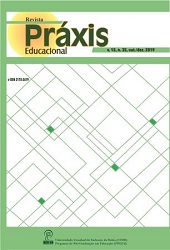DIFFERENT METHODOLOGIES OF TEACHING MATHEMATICS: EXPECTATION X EFFECTIVE EXPERIENCE
DOI:
https://doi.org/10.22481/praxisedu.v15i35.5657Keywords:
Evaluation Research, Teaching methodologies, Teaching practicesAbstract
This study had as main goal to analyze the Expectations and Effective Experiences about the teaching and learning process and the different teaching methodologies used in the pedagogical practices of the Mathematics area, based on the results of an Online Assessment, answered by 87 students, participants of the research, of the High School of Young and Adult Education (EJA) of the distance modality of the SESI School (Social Service of Industry) in Itapetinga-BA. A quantitative and intervention-type study, where we used the results of the Evaluation Surveys (Expectations and Effective Experiences), which were answered by the students before starting and finishing the Mathematics area. The "fears" demonstrated in the initial research result were reasons for the development of differentiated, autonomous and interactive teaching practices that had no familiarity with traditional teaching methods. Therefore, the planning was based on Problem Solving, Raciovitalism, Ethnomathematics and Mathematical Modeling, teaching methodologies, in which one of the common points is to prioritize the student's previous knowledge and relate to the mathematical contents of the school. The mediation took place in a way that corresponded to the efficacy presented by the tendencies, in which both the intellect and the emotions of the students were awakened. Given the importance of reason and emotion to walk together in a didactic, because it establishes strong bonds in the process of teaching and learning. Finally, we obtained excellent results regarding the overcoming of fears and the mathematical learning of the students, in which they were evident in the results demonstrated in the Evaluation Survey.
Downloads
Metrics
Downloads
Published
How to Cite
Issue
Section
License
You are free to:
Share - copy and redistribute the material in any medium or format; Adapt - remix, transform, and build from the material for any purpose, even commercially. This license is acceptable for Free Cultural Works. The licensor cannot revoke these freedoms as long as you follow the terms of the license.
Under the following terms:
Attribution - You must appropriately give credit, provide a link to the license, and indicate if any changes have been made. You may do so in any reasonable way, but not in a way that suggests that you or your use is endorsed by the licensor.
There are no additional restrictions - You cannot apply legal terms or technological measures that legally restrict others to make any use permitted by the license.










